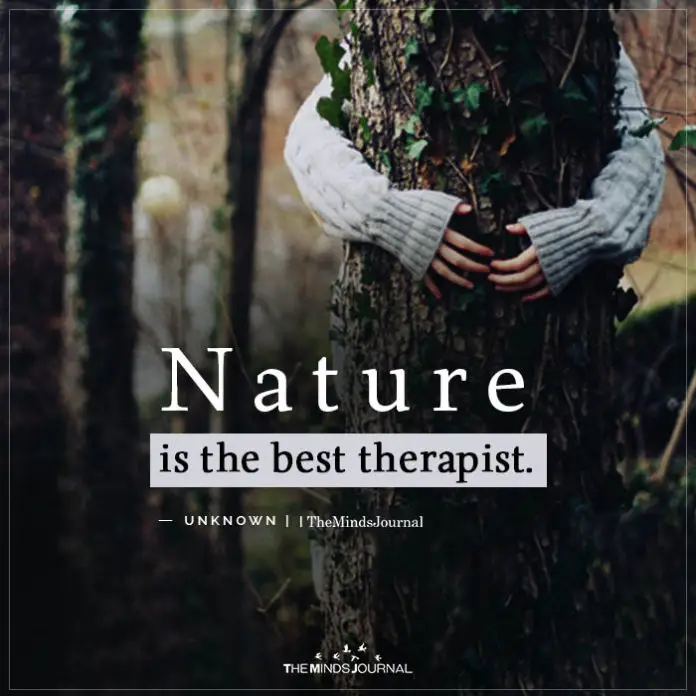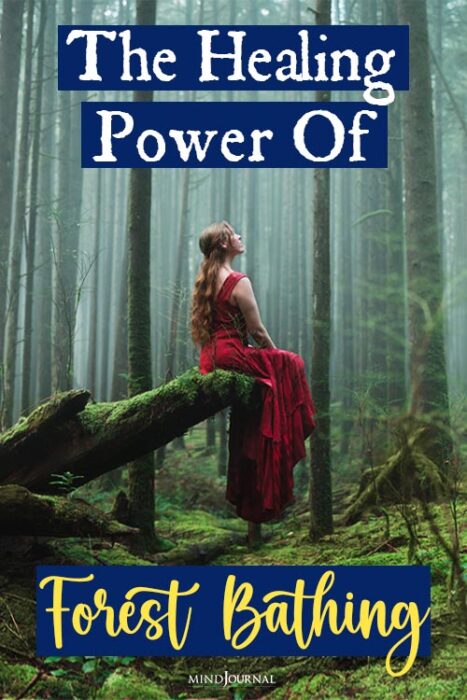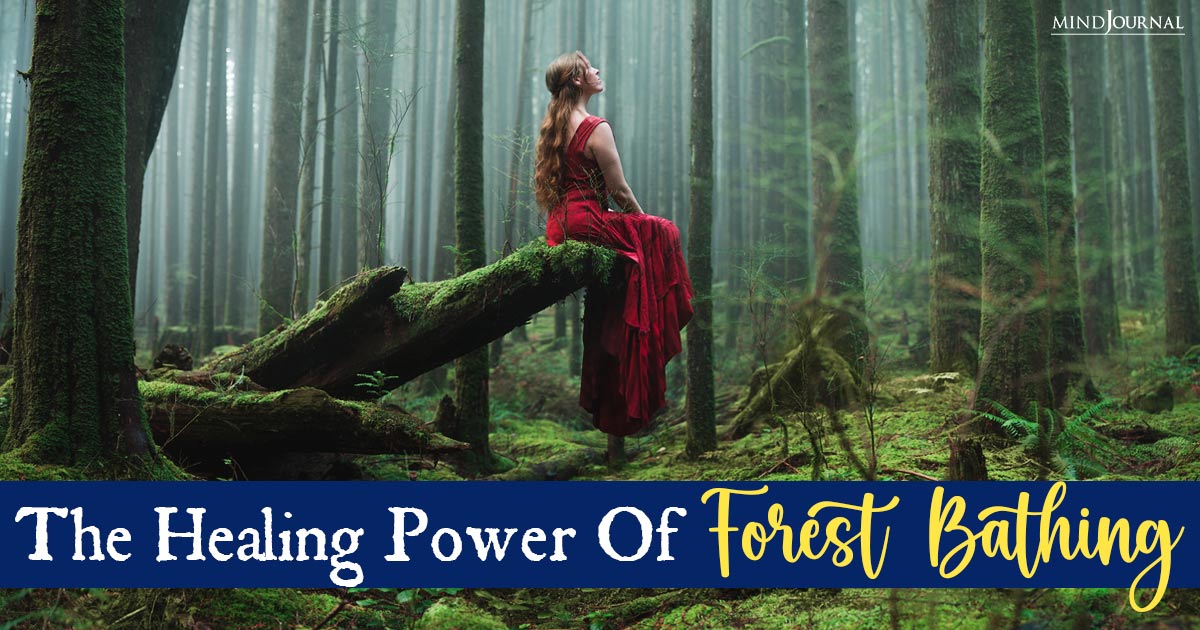If you ever feel like you are running on an empty tank and can really use a recharge, then try out forest bathing. Take a trip down to the woods and soak up on the goodness that nature has to offer, revive your energy, melt away your stress, and feel as fresh as a daisy.
KEY POINTS
- “Forest bathing,” which means walking in a natural environment, has powerful physical and psychological effects.
- Forest bathing causes a drop in stress hormones, calms your nervous system, and reduces blood pressure.
- Forest bathing reduces feelings of anger, confusion, depression, fatigue, and anxiety.
If someone told you there was a “life hack” that could help reduce your blood pressure, calm your heart rate, improve your mood, and give you feelings of contentment and life satisfaction, would you take their advice?
Whether or not it sounds plausible, it’s true, and it’s called “forest bathing.” Simply taking time out of your schedule to go for a walk in nature has been consistently found to have powerful, restorative effects on your psychology and your health.
“Forest bathing” (“shinrin yoku,”) a term coined by a Japanese government ministry in the early 1980s, has been defined as “making contact with and taking in the atmosphere of the forest,” and its effects have been documented with an ever-growing group of studies and scientific literature.
According to the journal Environmental Health and Preventive Medicine, it remains big in Japan: as long ago as 2004, the Association of Therapeutic Effects of Forests was founded; three years later, the Japanese Society of Forest Medicine was also established.
Related: Shinrin Yoku: How The Japanese Art Of Forest Bathing Can Improve Your Health
Why Forest Bathing Is Good For You
Today, with stress, depression, and anxiety afflicting the United States like never before—as noted in a 2020 review article in Frontiers in Psychology—it’s becoming increasingly clear that forest bathing could play a role in improving our mental health, too.
In the Frontiers article, almost eleven thousand papers were screened and more than a hundred fifty were included in a “scoping review” of the physiological benefits of forest bathing.
Walking in natural settings was associated with multiple health markers of reduced stress, including diminished blood pressure, decreased heart rate, reduced “fight-or-flight” nervous system activity, and increased activation in the parasympathetic nervous system (which is responsible for our body’s resting processes).
Reductions in cortisol (the “stress hormone” you may have read about) have also been found in people after they’ve spent time in nature, according to an International Journal of Environmental Health Research article completed too recently to include in the 2020 review.

The many advantages of “bathing” in nature—which means merely walking amongst the trees, listening to the sounds of the wind, the leaves, and the birds—also include the psychological.
The Frontiers article found multiple papers supporting the notion that forest bathing reduces “anger-hostility,” “confusion-bewilderment,” “depression-dejection,” fatigue-inertia,” and “tension-anxiety.”
People who took the time to walk in natural settings felt a soothing sense of comfort and improved feelings of calm refreshment. At the same time, they also felt energized and more “vigorous.”
Another 2020 study, conducted in Alabama and also published in the International Journal of Environmental Health Research, found possibly the best results of all: that visits to a state park offered a “significant improvement in subjective well-being” and “life satisfaction.”
These park visits had to last longer than 20.5 minutes to secure these powerful, positive effects, although the Frontiers article summarized studies concluding that you could experience benefits from as little as ten minutes in natural areas (and not what the study called “urbanized settings”).
Another study, published in Scientific Reports, concluded that to get these benefits, one needed to spend at least a hundred twenty minutes in nature every week. Each visit did not need to be the same length—you could string together a few short visits or take one two-hour hike at a time.
After about 250 minutes in nature each week, though, this study found that participants hit the maximum level of benefit, and noted that more time spent forest bathing did not offer any further gain.
The last question you might be asking yourself, understandably, is how all this could be possible—and how it might work. A 2020 study in the journal Emotion, reported on later that year in the New York Times, provides one possible answer: awe.
Related: 5 Brain Benefits Of Hiking According To Science
In other words, the experience of being amazed by something bigger than yourself, and the ability to place your own problems in the context of something huge, powerful, and hard to understand, could be good for you.
The Emotion study chronicled an attempt to teach experimental subjects—older adults—to “cultivate awe” as they took daily outdoor walks over the course of eight weeks. Subjects in the experimental condition reported feeling more positive emotions and reductions in feelings of anxiety or distress, as time went on.
The photos they took of themselves on these “awe walks” unexpectedly showed another change: in these selfies, the size of their faces shrank over time, so that by the end of the study the experimental participants depicted themselves as much smaller in relation to their environment than they did at the start of the study.
This seemed to imply, as the New York Times’ Gretchen Reynolds suggested, that the experience of relating to nature with awe and amazement can help us put our problems into perspective by seeing ourselves as only a small part of the massive, all-encompassing environment in which we live.
Perhaps 20 minutes spent walking in the woods, focusing on the details of the natural world and not on your personal problems, can help us recognize that feelings of peace and comfort can be constant and that the ups and downs of our daily lives may be transitory.

No matter how it works, though, “forest bathing”—spending time away from the built environment, in a landscape with its own rules and its own sense of time—clearly functions as a valuable, reliable stress release and affirms our good feelings about ourselves and our future.
References:
Gao, J., Mancus, G.C., Yuen, H.K., Watson, J.H., Lake, M.L., Jenkins, G.R. (2021). Changes in cortisol and dehydroepiandrosterone levels immediately after urban park visits. International Journal of Environmental Health Research, Dec 8:1-13.
Meredith, G.R., Rakow, D.A., Eldermire, E.R.B., Madsen, C.G., Shelley, S.P. & Sachs, N.A (2020) Minimum time dose in nature to positively impact the mental health of college-aged students, and how to measure it: A scoping review. Frontiers in Psychology, 10:2942.
Park, B.J., Tsunetsugu, Y., Kasetani, T. et al. (2010). The physiological effects of Shinrin yoku (taking in the forest atmosphere or forest bathing): evidence from field experiments in 24 forests across Japan. Environ Health Prev Med 15, 18.
Reynolds, G. (2020, September 30). An ‘awe walk’ might do wonders for your well-being. Retrieved from https://www.nytimes.com/2020/09/30/well/move/an-awe-walk-might-do-wonde…
Sturm, V. E., Datta, S., Roy, A. R. K., Sible, I. J., Kosik, E. L., Veziris, C. R., Chow, T. E., Morris, N. A., Neuhaus, J., Kramer, J. H., Miller, B. L., Holley, S. R., & Keltner, D. (2020). Big smile, small self: Awe walks promote prosocial positive emotions in older adults. Emotion. Advance online publication. Retrieved from https://psycnet.apa.org/doiLanding?doi=10.1037%2Femo0000876
White, M.P., Alcock, I., Grellier, J. et al. (2019). Spending at least 120 minutes a week in nature is associated with good health and wellbeing. Scientific Reports, 9, 7730.
Yuen, H. K. & Jenkins, G. R. (2020) Factors associated with changes in subjective well-being immediately after urban park visit, International Journal of Environmental Health Research, 30:2, 134-145.
Written By Loren Soeiro Originally Appeared On Psychology Today









Leave a Reply
You must be logged in to post a comment.